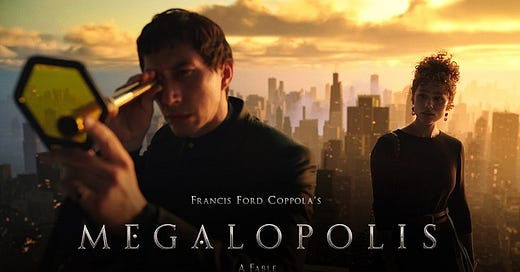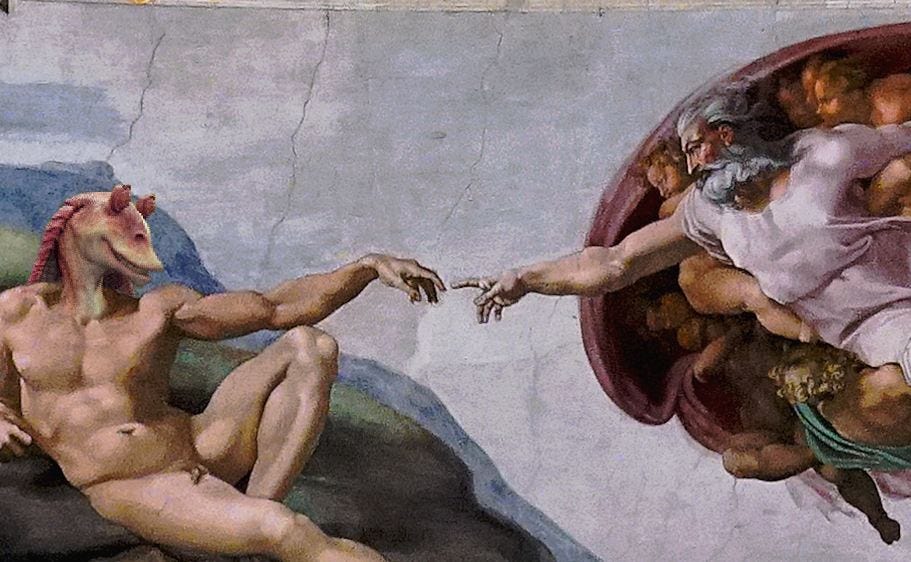***Hey! I’m doing a Q&A on the podcast this weekend, so please send your questions, thoughts, and detailed opinions about an elevator’s ability to accommodate a walrus (which came up in the comments section two days ago) to hereswhyyousuck@yahoo.com.
Of course I was going to see Francis Ford Coppola’s Megalopolis. I’m fascinated by how things get made, especially when they get made into fiery trainwrecks that are the only entertainment that my soulless body enjoys these days. Megalopolis is a passion project that took Coppola more than 40 years to make; he sold part of his winery to self-finance the film. That gave him freedom to do whatever he wanted, and the movie is basically the purest test of the auteur concept that there could ever be. Some people have called the film “batshit crazy”, while others who saw it were compelled to compare Coppola to Einstein and Picasso, and that dichotomy made a viewing a no-lose proposition as far as I was concerned.
I hoped Megalopolis would teach me something about auteurism. I’m of two minds about complete artistic freedom. On the one hand, I’m a writer, so of course I hate it when I sweat over a script only to have a 26 year-old studio exec who majored in sports marketing send back notes like “instead of a kindergarten teacher, could the main character be a hit man?” On the other hand, most of my favorite three-ring shit shows — like Studio 60 on the Sunset Strip and Waterworld — happened because an artist got so powerful that no-one could shoot down their bad ideas. With Megalopolis, Coppola — to his credit — pushed all his chips in and said “this is the film I wanted to make.” So…how did it go?
Megalopolis is the worst movie I’ve ever seen, ever will see, or ever could see. It’s like The Room, but with a $120 million budget. The film is more masturbatory than your typical OnlyFans live stream, and it made me embarrassed not only for the actors, but also for the crew, America, and Thomas Edison for having invented the movie camera in the first place. This movie is the most thorough destruction of a famous person’s reputation that didn’t involve a brutal stabbing at 875 South Bundy Drive, and I have probably (rightly) been placed on an FBI watch list just because I sat through the entire 138 minute run time.
Also: I’ll bet that Metacritic will rate this review a “20”.
As soon as the movie ended, I googled “Coppola + Megalopolis + drug use”, which turned up this description of Coppola’s artistic process from a crew member:
“He would often just sit in his trailer for hours on end, wouldn’t talk to anybody, was often smoking marijuana … And then he’d come out and whip up something that didn’t make sense, and that didn’t follow anything anybody had spoken about or anything that was on the page, and we’d all just go along with it, trying to make the best out of it.”
That’s what I would have guessed! There are Cheech & Chong movies less influenced by marijuana than Megalopolis. The movie is basically a series of vignettes dreamed up by a person who was obviously high; sober people don’t write things like “the vestal virgin enjoys a feast atop a giant eagle” or “a giant hand reaches out of the cloud and grabs the moon”. I just wish that William S. Burroughs was still alive so that he could lecture Coppola about the importance of grounded imagery and tight storytelling.
One thing that marijuana does is to make you think that all your ideas are genius. Which seems like the only way that Coppola could imagine that a trite (and incorrect1) observation like “America today is like the last days of Rome!” is groundbreaking political commentary. To hammer home the Roman theme, the movie takes place in a future version of New York where everyone is really into Roman shit, as if there’s a city-wide Ren Fest except based on Ye Olde Rome, not England. Characters speak in classical cadence…uh, sometimes — that comes and goes, and occasionally characters completely forget their “thous” and “thines” and say stuff like “What do you think of this boner I’ve got?” That line is spoken by…(shudder)…Jon Voight. The costumes are pseudo-Roman — lots of capes and laurels — with a dash of Dick Van Dyke in Mary Poppins, as shown in this picture, which I felt fine about taking because I was literally the only person in the theater:
Marijuana also makes you lose your train of thought. And that’s probably why Megalopolis is 10-15 different ideas for movies spliced together, with most storylines never going anywhere. There’s a major plot point in which Adam Driver’s character is accused of terrible crimes, but the next scene begins with a Simpsons-esque turn in which the mayor says “Welp…he was totally exonerated!” THEN WHY BRING IT UP??? Later, a satellite crashes into New York City, but we never see the consequences and everyone just kind of moves on. There’s a plot line about Driver being accused of killing his wife that is completely forgotten about 45 minutes into the film. Oh, and Driver can manipulate time, but he doesn’t ever do anything with it except to re-form broken bottles and sometimes watch shit in slow motion. It’s like if Tony Stark got the Iron Man suit and just used it to crush cans and the movie was actually about Tony Stark getting a bank loan.
The filmmaking is completely inept. There are line flubs, Tosh.0-quality green screen, and clumsy narration by a character in the movie who just disappears halfway through. But the goofiest mistake is surely the film’s glaring anachronisms — Coppola never decides when the movie is supposed to be set. Megalopolis is a world in which there are moving sidewalks, time-shifting devices, and also PRINT NEWSPAPERS! At one point, a character — supposedly living in 2090-whatever — hands another character a USB STICK, and you can even see that it’s USB TWO!!! The recipient doesn’t say “Uhh…I’ve only got USB-16 on this machine, what with it being the future and all” — he just plugs it into the side of his Dell monitor like it’s 2015! And then there are the cars — the cars in the movies are just…cars. Like cars now. Existing amidst magic holograms and weightless building materials. I swear to God: There’s a scene in which Adam Driver descends from the floating dreamscape in which he sculpts the future from gossamer and light and gets into a 2021 Nissan Pathfinder.
What could cause this insanity? Lots of drugs, certainly — which we addressed — and also ego. Adam Driver’s character is known to be a stand-in for Coppola; the film is largely an allegory for Coppola’s struggles against the studio system. Driver’s character — who is the chair of the Design Authority, which sounds like a mid-level bureaucrat who makes 60 grand a year but is apparently an extremely important person in the future — is basically an emperor, rock star, and Jesus-but-better rolled into one. Coppola’s stand-in is an uber genius with Godlike powers, oh and also hot chicks are always chasing after him and he fucks a lot. It reminds me of the proxies created by another one of my favorite megalomaniac auteur: Steven Seagal. Every Seagal character is the Ultimate Badass who has exactly two settings: 1) Kick ass, and 2) Be awesome. Coppola may have outdone Seagal’s egomania here.
We know for certain that Coppola considers himself a genius. In a lawsuit against Variety over allegations about Coppola’s on-set behavior, Coppola allowed this to be said about him:
The pretty well sums up Megalopolis’ viewpoint. All of the non-Driver characters are greedy and jealous and just want to tear him down. They’re small-minded vulgarians shackeling his ability to build a better world. Apparently, this is how Coppola sees himself; it’s the auteur viewpoint taken to an extreme.
And that’s why I’m hereby declaring my loyalty to Team Suits. I take back everything bad I ever said about you, film and TV industry! Please: Bury my scripts under a mountain of notes. Have every junior exec, sensitivity reader, and DoorDash delivery guy who took a Groundlings workshop tear my vision apart like a pack of hungry wolves. Because apparently, that process is the only thing keeping me from embarrassing myself like a dementia patient wandering through Albertson’s wearing just socks.
What I learned from Megalopolis is that any creative person should have smart people around them who will tell them the truth. I walked out of the movie thinking “I Might Be Wrong can’t be a one man operation forever.” I’ll need to find people whose opinion I trust and who will sometimes gently tell me “don’t do that, ya fuckin’ idiot.” I don’t think that relationship comes easily; I think it must have to be built over a long period of time. And I think that my favorite filmmakers — the Coen brothers — are probably lucky to have each other, because brothers share a special, unbreakable bond and also hate each other and exist to tear each other down.
Francis Ford Coppola is not a genius. Maybe he was once, but he’s not today. He’s a man who made a movie that might have accidentally demonstrated the danger of “one man’s lust for power,” which is the warning that opens the movie. Because within the world of this film, Coppola achieved the status of a dictator; whatever he said went, and everyone had to just “go along with it,” to quote one of his underlings. The result — as it so often is when one man has unchecked power — was an utter catastrophe. If Coppola intended to make a point about the dangers of dictatorship in the most roundabout, meta, vineyard-liquidating way imaginable…well, then maybe he’s a genius after all.
This is just so stupid. For starters: America is thriving. Even when you factor in Trump, whom I consider to be an extremely bad guy, I don’t think America is on the cusp of a Roman-style dictatorship even in the worst-case scenario. Also, the notion that Rome fell because it was too decadent — popularized by Edward Gibbon in the 18th century — is not a view widely shared by historians today. Finally, Coppola is conflating the fall of the Roman Empire in 476 AD with events that occurred near the end of the Roman Republic. Specifically, the movie is based partly on the Catilinarian conspiracy of 63 BCE — all of the “Rome fell because it was too decadent!” nonsense comes 500 years later.










I have to say that Apocalypse Now was also a drug fueled meandering rant. But that one worked
Best. Movie. Review. Ever. I saw Megalopolis, and this captures it perfectly, and draws the right moral. Thank you, Jeff!